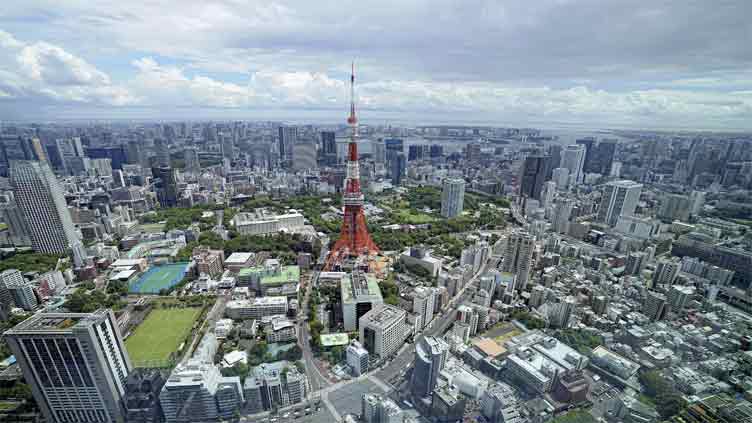Surging property prices squeezing out many. Tokyo is a case study

Business
UBS global real estate report ranks Japan’s capital as second most expensive city after Hong Kong
TOKYO (Reuters/Web Desk) – Rising property prices due to a plethora of reasons – ranging from the state policies to a lack of investment in production activities – an overwhelming majority in Pakistan can’t even dream of a buying a new home or a piece of land to construct one.
But state of affairs is the same in places around the world. Dubai is an example where people from low-income groups – including the unskilled workers from Pakistan – are unable to even rent a decent space. They have been forced to find a home in places like Sharjah and commute between work and home daily.
Dubai is the city where affluent people from around the world, including Pakistan, have invested in property sector, thus propelling the prices even higher with each passing day.
Read more: No more dreams as rich-poor divide widening at frightening pace
Now just think about the residents of Tokyo – one of the world’s most expensive cities to live in. Why Tokyo? Because Reuters in a latest report has explained how it is affecting the young people – obviously the largest chunk of aspirant homebuyers in any country. It begins with the story of a young professional.
YOUNG PROFESSIONALS IN TODAY’S TOKYO
Mie Kawamata dreamed of owning a home where she could tend a small garden and her 1-year-old daughter could play outside, yet still be close enough to commute to central Tokyo.
But after much searching, Kawamata and her husband, who both work in accounting, gave up on the house idea and bought an apartment about a third of the size that she'd wanted.
"I'm not sure ordinary people can buy a house anymore," Kawamata, 31, said. "Housing prices and rents have risen a lot compared to the past, but in the end, salaries haven't gone up that much."
After weathering decades of deflation and stagnant growth, Japan is seeing an investment boom that has made apartments in central Tokyo unaffordable for young Japanese professionals.
The flood of investment drove the average price for a new condominium in central Tokyo up 60 per cent to a record 129.6 million yen ($865,000) in the first half of this year, according to the Real Estate Economic Institute.
For locals, the surge in prices has made Tokyo the second most unaffordable city worldwide, only behind Hong Kong, according to a UBS global real estate report.
A 60 sq m (646 sq ft) apartment in Tokyo now costs 15 times a skilled worker's salary, up from 10 times a decade ago and well above London, Singapore and New York, the UBS report showed.
While partly due to low interest rates, the price surge is being driven by foreign buyers taking advantage of the weak yen, now near a 33-year low, and those looking to shift funds out of China, where a real estate crisis and geopolitical concerns are putting a chill on investment, according to property experts.
Foreigners have piled more than 1.8 trillion yen into Japanese real estate since 2019, outstripping flows from institutional investors, property funds, and corporations, according to consultancy Cushman & Wakefield.
And there's more to come. Funds from property speculators have piled up over the pandemic, and Japan looks to be a prime destination in Asia for it to land, said Cushman & Wakefield director Mari Kumagai.
"If they want to keep the money in Asia Pacific, it tends to be either Australia or Singapore or Japan," Kumagai said, adding that Japan was the most attractive of the three, based on value stability and size of the economy.
Average condo prices in central Tokyo were bumped up in the past year by a large supply of high-end residences hitting the market. Emblematic of that is the new Azabudai Hills complex, featuring the country's largest office tower and about 1,400 residential units.
The Azabudai project, which looms over the iconic Tokyo Tower, is catching the attention of investors in Taiwan, said Wang Mao San, president of Shingi-fusaya Realty Inc.
Super wealthy Taiwanese are snapping up Tokyo properties worth more than 100 million yen for second homes, he said, while regular rich investors focus on condos in the 30-70 million yens range in Tokyo and the western metropolis of Osaka.
"In Japan, the political and economic situation is stable," Wang said about the attractiveness of the market. "Tokyo is still not that expensive compared to other big cities like Hong Kong and London."
A luxury condo in Tokyo's high-end Motoazabu area is priced at less than half that of Hong Kong and 45pc cheaper than London, according to the Japan Real Estate Institute data.
That's cold comfort for Mari Mochizuki, a single mother and salesperson for a music company who's been hunting in vain for an apartment big enough for her piano and perhaps the addition of a cat.
The 39-year-old is eager to find a place that will hold its resale value in case she has to move for work. But the options she's seen in the city centre are either too pricey or worn out, pushing her search area to the northern edges of the capital.
"It seems like prices for every apartment of decent size are blindly going up, even those out of the way areas or with surprisingly cheap interiors," she said.

